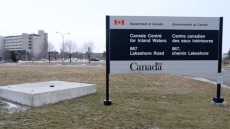EDMONTON — Environmentalists are calling U.S. president Barack Obama's decision not to approve the Keystone XL pipeline a "victory for people power."
Keith Stewart of Greenpeace says when the controversy over the oilsands pipeline began seven years ago, he didn't think it would be possible to defeat it.
He says the pipeline became such a big issue because rapid oilsands expansion in Canada made Keystone the only way for environmentalists to oppose the fossil fuel industry's growth.
Simon Dyer of the clean energy think-tank Pembina Institute says Obama's decision will force Canadian regulators to consider the climate-change impacts of other energy pipelines being considered.
Mark Jaccard, an energy economist at Simon Fraser University, says Keystone was an easy target for U.S. environmental groups because Canada's previous government dragged its feet on addressing climate change.
A look at the status of other pipeline projects in Canada
CALGARY — The U.S. government announced Friday it has rejected TransCanada's Keystone XL pipeline, which would have shipped crude from Alberta's oilsands to refineries in Texas.
Here is an update on the status of other major pipeline proposals in Canada as well as a look at the amount of oil shipped by rail.
Energy East:

TransCanada, the same company behind Keystone XL, applied to the National Energy Board in October 2014 to build the Energy East Pipeline. The project aims to ship 1.1 million barrels of Alberta crude a day across six provinces and 4,600 kilometres.
The idea is to supply crude to import-dependent eastern refineries as well as export landlocked Alberta oil to Europe and India. Energy East would repurpose existing natural gas pipe for about two thirds of the way and build new pipe through Quebec and New Brunswick.
TransCanada initially aimed to export crude from two locations: one in Cacouna, Que., and one in Saint John, N.B. In April, it scrapped Cacouna because of concerns over beluga habitat, and on Thursday it announced it was nixing the proposal to build an export terminal in Quebec altogether.
Energy East's startup date has been delayed by two years to 2020. TransCanada has also warned project costs are expected to rise above the initial estimate of $12 billion, which would have already been one of the most expensive infrastructure projects in Canadian history.
The company is amending its regulatory application to remove plans to build a port in Quebec.
Line 9B:
Enbridge obtained regulatory approval for its Line 9B reversal and expansion project in March 2014. The original Line 9 has been in the ground for four decades and had been running from Montreal to southwestern Ontario since 1998. But given shifting market dynamics, Enbridge decided to restore its flow to its original west-to-east configuration.
That would enable crude to get to Quebec refineries, like Suncor Energy's facility in eastern Montreal. The project also involves boosting the line's capacity to 300,000 barrels a day from 240,000 barrels.
Work on the project has been complete since the fall of 2014. The National Energy Board gave its blessing to start Line 9B in September of this year, and Enbridge has been filling up the line, with oil shipping expected to begin next month.
Northern Gateway:

Enbridge's Northern Gateway pipeline would ship 525,000 barrels a day of oilsands crude from northeast of Edmonton to Kitimat, B.C. Its goal is to sell Alberta crude in lucrative Asian markets. A parallel line would bring 193,000 barrels a day of bitumen-thinning diluent in the opposite direction.
Northern Gateway has been hugely controversial. The idea of crude-oil laden supertankers navigating the choppy waters of the Douglas Channel on their way out to the Pacific is a non-starter for many British Columbians. The line also passes through huge tracts of unceded First Nations territory in British Columbia. Though Enbridge has signed agreements with many First Nations along the route, many — especially on the coast — are staunchly opposed.
Enbridge has had a federal permit to build Northern Gateway since mid-2014 but has not made a final decision to proceed. The project could face lengthy delays in the courts as opponents launch legal challenges to Ottawa's approval. Last month, the Federal Court of Appeal reserved its decision on whether to uphold or quash that approval.
The company is working to "re-engage" with First Nations and work out an updated cost estimate. The joint review panel's report in late 2013 pegged the cost at $7.9 billion.
Trans Mountain:
The Canadian arm of U.S. energy giant Kinder Morgan is aiming to nearly triple the capacity of its Trans Mountain pipeline to 890,000 barrels of oil a day. The existing Trans Mountain line currently ships 300,000 barrels a day of various petroleum products from the Edmonton area to the B.C. Lower Mainland and Washington State.
The $5.4-billion project has faced stiff opposition from those who do not want to see more crude-filled tankers moving through the Burrard Inlet. Protesters held up survey work on Burnaby Mountain late last year.
Kinder Morgan filed its regulatory application for the Trans Mountain expansion in late 2013. The National Energy Board hearing process for Trans Mountain has been highly criticized, with commenters and intervenors withdrawing from the process.
The board has issued 145 draft conditions that Kinder Morgan must meet if the project is to be approved, and the company says that's achievable. The Tsleil-Waututh Nation in North Vancouver, B.C., has also asked the Federal Court of Appeal to stop the board's review, arguing it hasn't been consulted.

Crude-by-Rail:
In the absence of new pipelines, crude producers have been increasingly moving their product to market on trains. The safety concerns about this mode of transport came into stark relief in July 2013, when an oil-laden train rolled downhill, exploded and killed 47 people in Lac-Megantic, Que.
In a June report, the Canadian Association of Petroleum Producers said crude-by-rail volumes averaged 185,000 barrels a day in 2014.
The association said it expected shipments to grow to 200,000 barrels a day this year, 250,000 barrels a day next year and as many as 600,000 barrels a day if Keystone XL is not built. But rail volumes could "decrease significantly" with Keystone XL in place, it said.
The majority of industry players say they would prefer to ship their crude through pipelines because it's safer, cheaper and more efficient.
Though rail is often seen as a stop-gap measure while pipelines remain in limbo, many producers see it as a permanent way to access niche markets that aren't connected to the pipeline system, thanks to its flexibility.





